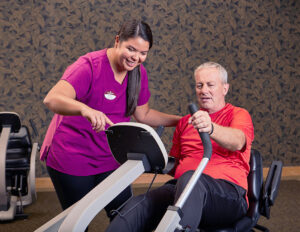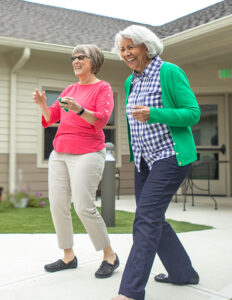Sponsored content by Nikki Easton, Brand Ave. Studios contributing writer
Wellness care is an idea that flourished decades ago, and it’s helping people live longer, healthier and more fulfilling lives.
But what exactly is wellness care—and how is it different from health care?
Health care deals with medical conditions you already have. Wellness care is all about fostering optimal health and preventing disease before it happens, focusing on the whole person— physically, mentally, socially and spiritually.
Research has proven how effective wellness care can be. In fact, in the spring of 2024, a study at the University of Chicago found that senior housing residents live longer than other folks in their age group—and a key factor is the preventive care they receive.
That’s why wellness care, along with nursing support, is an integral part of life at Primrose—and it is why residents there are thriving.

Diet and exercise
According to the National Institutes for Health, half of the adults in the U.S. have chronic diseases related to diet and physical inactivity. These include cardiovascular disease, high blood pressure, type 2 diabetes and certain types of cancer.
Diet and exercise are a vital part of any wellness program—and they’re not only important for your physical health, they’re also a great antidote to anxiety and depression.
At Primrose, residents enjoy delicious, balanced meals prepared from nutritious foods, freshly prepared in healthful ways. If you have special needs—low salt, low fat, low sugar, for example—your meals can be prepared accordingly.
Primrose offers access to Spiro100, which provides web and app video streaming fitness and wellness classes, featuring over 140 full-length exercise and meditation sessions There are also a range of fitness programs, including strength training and balance—so important for preventing falls—as well as chair yoga and more. And every Primrose community has its own fitness room, so you can exercise on your own schedule, too.
Social connection
Friendship and social interaction are as important for your well-being as exercise and nutrition, but as people age they often experience loneliness and isolation. This too can affect your health, increasing the risk for heart disease, depression and cognitive decline.

That’s why you’ll always find a warm, welcoming atmosphere at Primrose, along with an array of events that make socializing an easy, natural part of community life.
You’ll find plenty of opportunities to socialize on the community calendar, perhaps a fun event like “Jokes and Floats” (what better way to make friends than sharing a laugh), a birthday celebration, or a get-together where people become better acquainted by sharing personal histories. And just about anytime, you can go down to the community café and chat with neighbors over a good cup of coffee or tea.
Mental stimulation
To keep your mind sharp and encourage lifelong learning, you can take part in a unique program called Primrose Senior University. Among the activities it offers are brain exercises, reading groups and courses on a range of fascinating subjects.
Topics have included the Civil War, the great American artist Norman Rockwell, and various eras residents have lived through. The presentations keep things lively and interesting.

The spiritual side of life
Religion and spiritual connection can also play an important role in wellness care. In fact, a recent study at the Yale School of Medicine found that religious services may actually improve physical health and psychological well-being.
At Primrose, you can attend denominational or nondenominational services in the community chapel—and you’re also welcome, when the need arises, to experience deep spiritual comfort in the chapel on your own.
Residents have access to Coro Health, a multi-faith audio and video library that supports spiritual and religious connection. In addition, Primrose offers meditation classes, another path to spiritual connection, as well as deep relaxation, clarity and insight.
For more information, visit primroseretirement.com.
